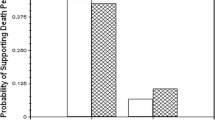Abstract
Many business, political, and personal disputes in the United States are settled only after passing through the nation's judicial or regulatory system. The culmination of this process is frequently a hearing or trial in which the opposing parties argue the merits of the case. Demographic factors play a critical role in many of these disputes and demographers are often called upon to testify in hearings or trials. This article discusses the role of the demographer as expert witness and offers some tips on how to prepare and present expert testimony. The objective is to provide some practical guidance to prospective witnesses which will help them maximize effectiveness and minimize emotional distress when testifying in adversarial legal proceedings.
Similar content being viewed by others
References
Black, D.J. (1972). The boundaries of legal sociology,Yale Law Journal 81: 1086–1101.
Brodsky, S.L. (1991).Testifying in Court: Guidelines and Maxims for the Expert Witness. Washington DC: American Psychological Association.
Chesler, M.A., J. Sanders & D.S. Kalmuss (1988).Social Science in Court: Mobilizing Experts in the School Desegregation Cases. Madison, WI: University of Wisconsin Press.
Dorram, P.B. (1982).The Expert Witness. Planners Press, American Planning Association.
Fisher, F.M. (1986). Statisticians, econometricians, and adversary proceedings,Journal of the American Statistical Association 81: 277–286.
Kalmuss, D.S. (1981). Scholars in the courtroom: Two models of applied social science,The American Sociologist 16: 212–223.
Loftus, E.S. (1986). Experimental psychologist as advocate or impartial educator,Law and Human Behavior 10: 63–78.
MacHovec, F.J. (1987).The Expert Witness Survival Manual. Springfield, IL: Charles C. Thomas Publishers.
McCloskey, M., H. Egeth & J. McKenna (1986). The experimental psychologist in court: The ethics of expert testimony,Law and Human Behavior 10: 1–13.
Meier, P. (1986). Damned liars and expert witnesses,Journal of the American Statistical Association 81: 269–276.
Richardson, J.T., K.G. Swain, J. Codega & K. Bazzell (1987). Forensic sociology: Some cautions and recommendations,The American Sociologist 18: 385–393.
Sperlich, P.W. (1980). Social science evidence and the courts: Reaching beyond the adversary process,Judicature 63: 280–289.
Wolf, E.P. (1976). Social science and the courts: The Detroit schools case,Public Interest 42: 102–120.
Wolfgang, M.E. (1974). The social scientist in court,Journal of Criminal Law and Criminology 65: 239–247.
Author information
Authors and Affiliations
Rights and permissions
About this article
Cite this article
Smith, S.K. Expert testimony in adversarial legal proceedings. Popul Res Policy Rev 12, 43–52 (1993). https://doi.org/10.1007/BF01074508
Issue Date:
DOI: https://doi.org/10.1007/BF01074508




